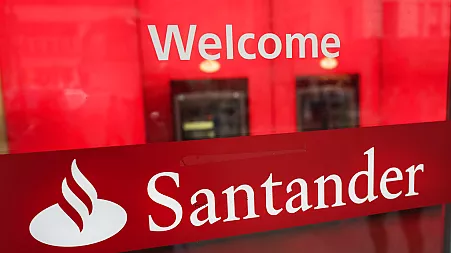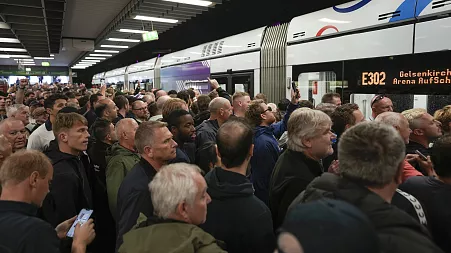Amazon workers in Coventry have rejected a landmark deal to form a trade union, in a blow to campaigners who called for the tech giant to recognise collective bargaining rights in the UK.
Of those who voted, 49.5pc of votes were in favour of a proposal put forward by the GMB union, which has vowed to launch a legal challenge against the result. This was below the 50pc threshold to pass.
Union officials accused the US company of “union-busting” activities in the run up to the poll, claiming bosses had targeted workers with an “unrelenting campaign” of anti-union messaging. According to one source, the union lost by a margin of just 28 votes.
For months, Amazon’s Coventry warehouse has been the site of a bitter campaign between unions and bosses, with 3,000 workers at its fulfilment centre caught in the middle.
Union members have joined picket lines outside Amazon’s site to persuade workers unhappy with pay and conditions to join them, following similar successful attempts in the US.
Hundreds of workers have taken part in strike action at Coventry so far this year. The warehouse has proved a hub of union activity and was the epicentre of earlier “wildcat” strikes in 2022 – which culminated in a mass sit-in.
While GMB placards have often lined the road to the Coventry site, inside, Amazon has launched a charm offensive – with free snacks and team meetings during typically labour-intensive shifts – to convince workers that voting for recognition may not be in their best interests.
The union has characterised this effort as an “unrelenting campaign” of anti-union messaging. The GMB is now considering a legal challenge on the basis of an “Inducement Claim”, alleging Amazon pressured workers to quit the union.
Stuart Richards, a GMB senior organiser, said: “From day one, Amazon have been relentless in their attacks on their own workforce.”
Amazon’s strategy included posters, seen by The Telegraph, with QR codes that generated emails for workers to cancel their union membership. Lawyers for the workers argue Amazon’s QR codes were unlawful and may have influenced more than 50 staff members to quit the union in the run up to the ballot. Amazon was also accused of having pressured workers to attend “anti-union seminars”.
Rosa Curling, director of non-profit law firm Foxglove, said it was supporting 900 workers in the inducement claim against Amazon. “Attention must now turn to Amazon’s behaviour before and during this ballot process – they have not played fairly.”
It is understood the GMB will raise the issue with the new Labour Government, which is planning a new employment rights law to make it easier for workers to access union rights. Curling, of Foxglove, says the vote “squeaked under the line ... just before a new Labour Government”.
However, an Amazon spokesman denied that the company had acted improperly.
“Throughout the ballot process, attendance at Amazon employee meetings was entirely voluntary,” the spokesman said. “Employees were informed of this when they were invited to a meeting and also at the start of each meeting. The GMB held similar meetings with our employees on site, which were also voluntary.”
Sources said the union drive had been met with an effective counter-campaign. Workers were given information about the ballot in 26 languages by Amazon, while senior managers held multiple briefings with staff.
In a recording from an “associate forum”, viewed by The Telegraph, an Amazon staff member warns: “If the GMB is recognised, this means we cannot give you any increases to pay, any one-off payments or bonuses, we cannot make changes to your hours of work, your shift arrangements or holidays – including those changes that you like and you asked for – without the GMB agreeing.”
They also warned that if workers failed to vote, they could find decisions being made by the union without their input.
“The GMB is a business and will prioritise its own members’ voice over those of you that choose not to pay,” they said.
In the meeting, the Amazon staff member also extolls the company’s associate forum system, where employee-elected representatives can bring complaints and concerns to executives. An Amazon spokesman said: “We value that direct relationship and so do our employees.”
Despite union anger over its counter offensive Amazon insists its QR codes were neutral in tone, a spokesman said its seminars and QR codes aimed to ensure workers made an “informed decision when they voted in the ballot”, pointing to official government information about union rights. One QR poster seen by The Telegraph reads: “You decide what’s best for you.”
While union leaders have called for a pay rise to £15 per hour for Amazon workers, in the leaked audio, the senior staff member warns Coventry could be left behind other warehouses by union wrangling when pay reviews conclude in October this year.
“The pure reality of the situation is the union knows it cannot force a pay rise of £15 an hour,” the Amazon staff member warns. They add: “This back-and-forth could go on for a long, long time, while everybody else is already getting the pay rise.”
The staff member adds that Amazon would not be under pressure to award back pay for striking workers or come to a deal, unlike the NHS.
“What we’re not doing is educating children and performing brain surgery,” they say.
Tom Vickers, an associate professor at Nottingham Trent University who has been documenting the GMB campaign, says that the information provided to workers “skewed heavily” in favour of Amazon, which flooded the site with external managers and experts to ward off the GMB. Fears on the shop floor that workers could face delayed pay rises appeared to have hit home. Turnout in the vote was 86pc.
“Many Amazon workers are from a migrant or refugee background and have family in their country of origin who rely on the money they send home,” says Vickers. “The wider precariousness workers face because of the cost of living, temporary contracts ... all need to be taken into account.”
In a second recording, another Amazon worker heatedly disputes the company’s official narrative, arguing workers in France and Germany – who are unionised – get a better deal. “They have more than us,” he says.
Amazon pay currently starts at between £12.30 and £13 per hour, depending on location, above the National Living Wage. Insiders believe this compares favourably to other warehouse or supermarket roles.
The defeat for the GMB comes amid a wider challenge to the union movement – even in a Labour stronghold such as Coventry. Nationwide, union membership is close to its lowest levels since 1995. In 2023, there were 6.4m union members in Britain, down on 13m in the 1970s.
In part, this is down to a decline in traditionally unionised jobs, such as in manufacturing, and a rise in the number of private sector roles overall. An increase in self-employment and casual work has also led to a decline in the percentage of workers paying union subscriptions.
The Trades Union Congress has bemoaned its struggle to attract younger members, who do not see the movement as “relevant”. According to official data, union membership often skews towards more highly paid public sector workers, rather than low-paid shift workers like those in Coventry.
The defeat at the Coventry warehouse “is a significant blow for the GMB,” said Sarah Harrop, an employment lawyer at Addleshaw Goddard. The union will not be able to apply for statutory recognition for another three years after Wednesday’s failure, she adds.
Amazon, meanwhile, will hope victory can head off further union agitation across the country. It could also seek to bring the playbook that helped eke out a victory in Coventry to other sites.
In the leaked recording, the Amazon worker taking issue with the company’s handling of the dispute says widespread action is what the tech giant truly fears. They said: “You’re scared because it’s here, because tomorrow maybe in Birmingham and another day London.”
Disclaimer: The copyright of this article belongs to the original author. Reposting this article is solely for the purpose of information dissemination and does not constitute any investment advice. If there is any infringement, please contact us immediately. We will make corrections or deletions as necessary. Thank you.




